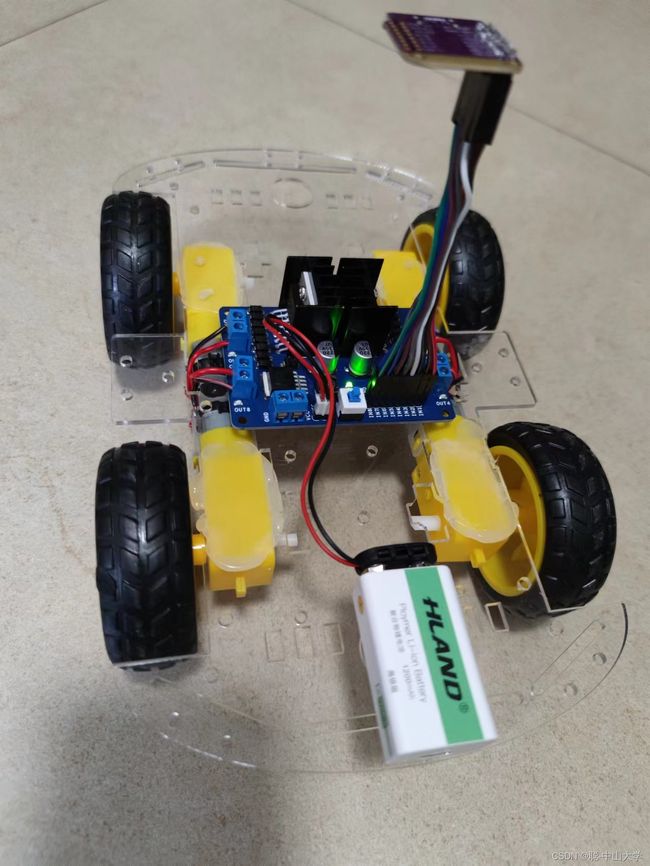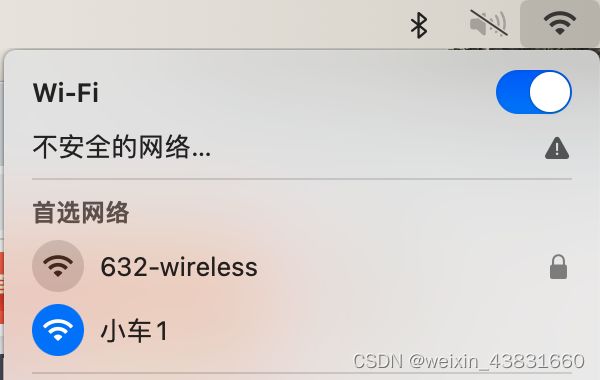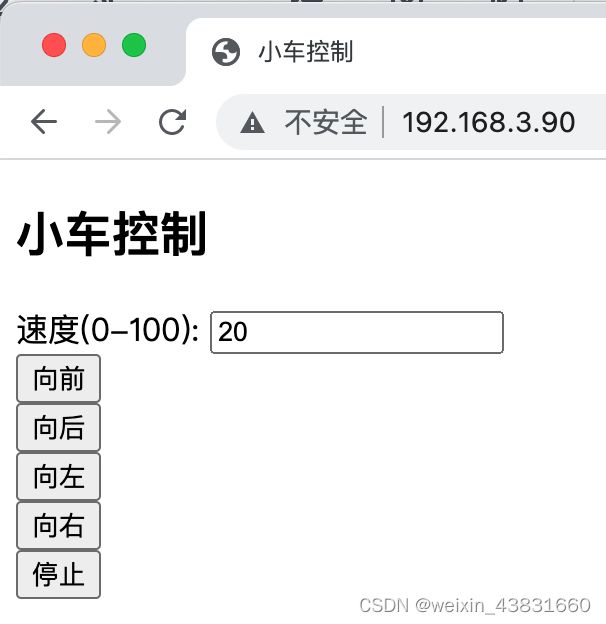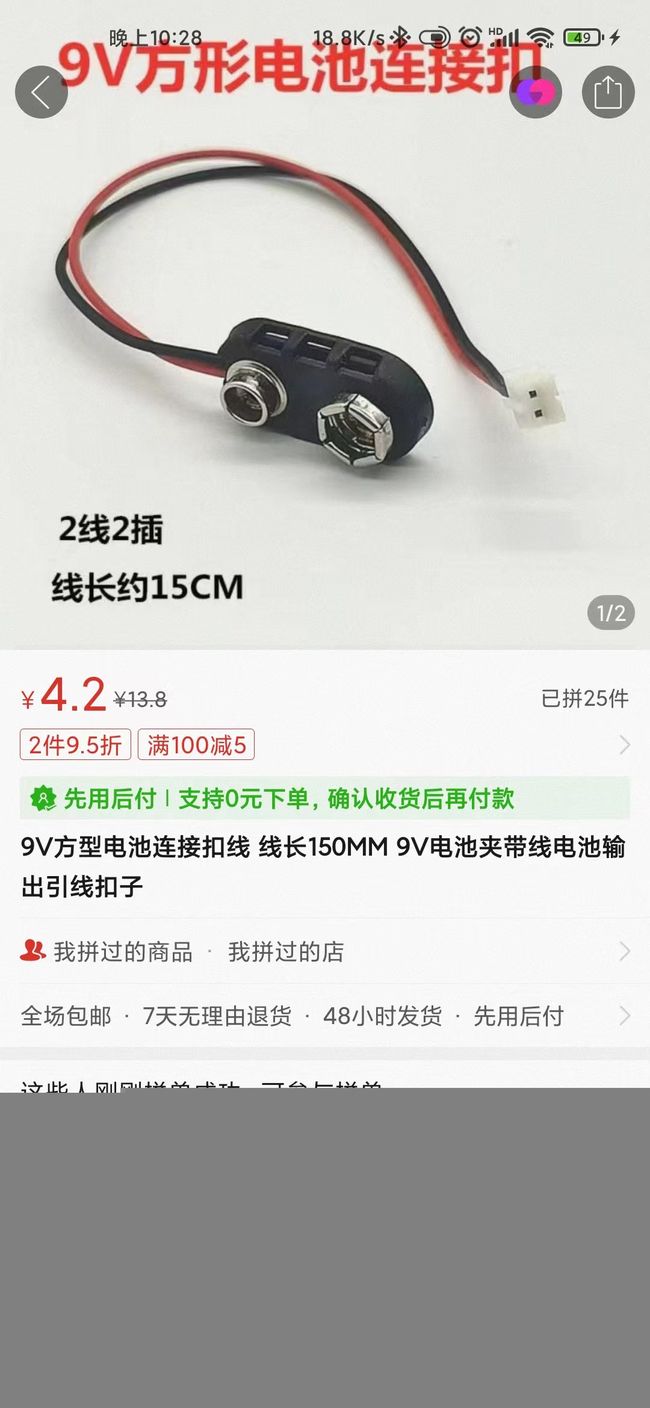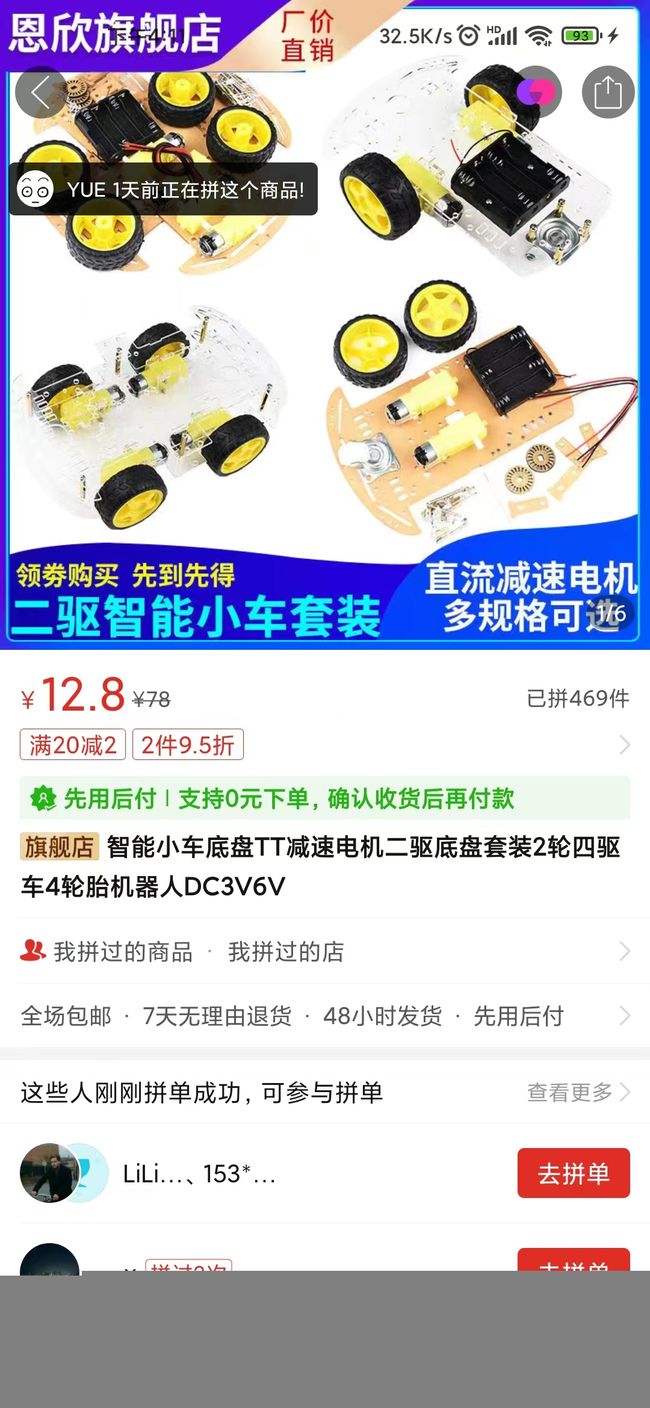低成本小车, esp32, micropython, wifi, 浏览器控制控制(四轮版)
内容
- 成品演示
- 硬件购买
- 软件开发环境
- 代码
成品演示
硬件成品
浏览器输入 http://192.168.4.1 设置小车需要连接的Wi-Fi名和密码,让小车连接本地Wi-Fi
在上图底部可以看到小车获得的Wi-Fi地址 (如192.168.3.90)
浏览器输入 http://192.168.3.90 得到控制小车的页面
控制小车网页
硬件连线
硬件购买
硬件购买拼多多页面截图
软件开发环境
下载esp32s2 Micropython 固件,以便运行Python程序
MicroPython - Python for microcontrollers
下载v1.19.1固件,并按上面连接中描述的方法写入到 esp32 S2 mini 中
安装 Thonny, Python IDE for beginners 并把以下本项目的代码通过Thonny 写入Esp32s2
代码
L298N.py
from machine import Pin, PWM
class DCMotor:
def __init__(self, pin1, pin2, enable_pin, min_duty=400, max_duty=1023, frequency=1023):
self.pin1 = Pin(pin1, Pin.OUT)
self.pin2= Pin(pin2, Pin.OUT)
self.enable_pin = PWM(Pin(enable_pin), frequency)
self.min_duty = min_duty
self.max_duty = max_duty
def forward(self, speed):
self.speed = speed
self.enable_pin.duty(self.duty_cycle(self.speed))
self.pin1.value(1)
self.pin2.value(0)
def backward(self, speed):
self.speed = speed
self.enable_pin.duty(self.duty_cycle(self.speed))
self.pin1.value(0)
self.pin2.value(1)
def stop(self):
self.enable_pin.duty(0)
self.pin1.value(0)
self.pin2.value(0)
def duty_cycle(self, speed):
if self.speed <= 0:
self.speed = 0
if self.speed > 100:
self.speed = 100
duty_cycle = int (self.min_duty + (self.max_duty - self.min_duty)*self.speed/100.)
print((self.max_duty - self.min_duty)*self.speed)
print((self.max_duty - self.min_duty)*self.speed/100.)
print(self.min_duty)
print(self.speed,duty_cycle)
return duty_cycle
car.py
from L298N import DCMotor
from machine import Pin
class Car:
def __init__(self, ins, ens):
self.motor_11 = DCMotor(ins[2],ins[3],ens[1])
self.motor_12 = DCMotor(ins[6],ins[7],ens[3])
self.motor_21 = DCMotor(ins[0],ins[1],ens[0])
self.motor_22 = DCMotor(ins[4],ins[5],ens[2])
self.stop()
def stop(self):
self.motor_11.stop()
self.motor_12.stop()
self.motor_21.stop()
self.motor_22.stop()
def forward(self, speed):
self.motor_11.forward(speed)
self.motor_12.forward(speed)
self.motor_21.forward(speed)
self.motor_22.forward(speed)
def backward(self, speed):
self.motor_11.backward(speed)
self.motor_12.backward(speed)
self.motor_21.backward(speed)
self.motor_22.backward(speed)
def right(self, speed):
self.motor_11.forward(speed)
self.motor_12.backward(speed)
self.motor_21.forward(speed)
self.motor_22.backward(speed)
def left(self, speed):
self.motor_11.backward(speed)
self.motor_12.forward(speed)
self.motor_21.backward(speed)
self.motor_22.forward(speed)
main.py
from car_ import Car
import time
car = Car(33,35,16,18)
car.stop()
def car_action(act):
act = act.split('_')
if len(act)!=2:
return
try:
act, speed = act[0], int(act[1])
except:
return
if act=='forw':
car.forward(speed)
if act=='back':
car.backward(speed)
if act=='left':
car.left(speed)
if act=='right':
car.right(speed)
if act=='stop':
car.stop()
from serv.__main__ import start_server_
from serv.lib.esp32_ import ESP32_
esp32_ = ESP32_()
start_server_(80, 1, esp32_.html_, car_action)
esp32_config.json
{"ap_name": "632-wireless", "ap_pwd":"******", "essid":"小车1", "led_pin":15}wifi_index.html
ESP无线网络设置
设置无线网络
接入点 密码
当前IP地址: %s
control_page.html
小车控制
小车控制
serv/__init__.py
#serv/__main__.py
import json, os
_content = ''
with open('control_page.html') as fp:
_content = fp.read()
_car_action = None
def home(request_, response_, route_args_):
if 'car_action' in route_args_ and _car_action is not None:
_car_action(route_args_['car_action'])
return response_.write_response_OK_(content_type_='text/html', content_=_content, charset_='UTF-8')
rpc_registry = {}
def ajax_(request_, response_, route_args_):
global rpc_registry
params_ = request_.params_
assert 'data' in params_, '服务请求参数中缺少 data'
data = json.loads(params_['data'])
assert 'func_name' in data
assert 'argv' in data
func_name = data['func_name']
argv = data['argv']
assert func_name in rpc_registry, f'服务中没有登记函数 {func_name}, 所有函数: {", ".join(rpc_registry.keys())}'
res = rpc_registry[func_name](*argv)
json_ = json.dumps(res)
return response_.write_response_JSON_OK_(json_)
def start_server_(port_, max_threads_, esp32_html_=None, car_action=None):
from .lib.http_ import Http_
http_ = Http_(ip_='0.0.0.0', port_=port_, web_path_='web', max_threads_=max_threads_)
if car_action is not None:
global _car_action
_car_action = car_action
if esp32_html_ is not None:
http_.add_route_('/', esp32_html_, client_addr_='192.168.4.')
http_.add_route_('/ajax', ajax_, 'GET')
http_.add_route_('/ajax', ajax_, 'POST')
http_.add_route_('/', home, 'GET')
http_.add_route_('/home/{car_action}', home, 'GET')
http_.start_()
if __name__ == '__main__':
start_server_(80, 100)
serv/lib/__init__.py
#serv/lib/esp32_.py
# ESP 32
# 这个文件包含两个线程,一个是WIFI链接的,另一个是板上LED的
import machine
import time, network, json
from .http_ import Http_
def time_str_():
t_ = time.localtime(time.time())
return '%d/%d/%d %d:%d.%d' % (t_[0], t_[1], t_[2], t_[3], t_[4], t_[5])
class ESP32_:
def __init__(self):
self.config = None
self.load_config()
self.onboard_led = machine.Pin(self.config['led_pin'], machine.Pin.OUT)
self.ap_if = network.WLAN(network.AP_IF)
if self.config is not None:
if 'essid' in self.config:
self.ap_if.config(essid=self.config['essid'])
if 'password' in self.config:
self.ap_if.config(password=self.config['password'])
self.ap_if.active(True)
print('ESP32 本地热点配置:', self.ap_if.ifconfig()) # IP address, netmask, gateway, DNS
self.sta_if = network.WLAN(network.STA_IF)
self.ip_addr = None
self.is_connected_ = False
with open('wifi_index.html') as fp:
self.html_tempt = fp.read()
if self.config is not None:
self.connect()
def load_config(self):
try:
with open('esp32_config.json') as fp:
self.config = json.load(fp)
except:
self.config = None
def save_config(self):
with open('esp32_config.json', 'w') as fp:
json.dump(self.config, fp)
def connect(self, wait_time=60):
self.onboard_led.on()
self.sta_if.active(False)
self.sta_if.active(True)
self.is_connected_ = False
try:
self.sta_if.connect(self.config['ap_name'], self.config['ap_pwd'])
self.ip_addr = 'ESP32 正在连接 %s ...' % self.config['ap_name']
print(self.ip_addr)
except OSError as ex:
self.ip_addr = 'ESP32 异常 ' + str(ex)
print(self.ip_addr)
self.sta_if.active(False)
self.onboard_led.on()
return
start_time_ = time.time()
while not self.sta_if.isconnected():
if time.time() - start_time_ > wait_time:
break
if self.sta_if.isconnected():
self.is_connected_ = True
self.onboard_led.off()
self.ip_addr = '[%s] %s (%s)' % (self.config['ap_name'], self.sta_if.ifconfig()[0], time_str_())
print('ESP32 已连接: ', self.ip_addr)
else:
self.ip_addr = 'ESP32 未能连接到 %s' % self.config['ap_name']
print(self.ip_addr)
self.sta_if.active(False)
self.onboard_led.on()
def get_html_(self):
if self.config is None:
ap_name = ap_pwd = ''
else:
ap_name, ap_pwd = self.config['ap_name'], self.config['ap_pwd']
return self.html_tempt % (ap_name, '', '未连接无线网络' if self.ip_addr is None else self.ip_addr)
def html_(self, request_, response_, route_args_):
print('ESP32 连接', request_.addr_)
params_ = request_.params_
if 'ap_name' in params_ and 'ap_pwd' in params_:
if self.config['ap_name'] != params_['ap_name'] or self.config['ap_pwd'] != params_['ap_pwd']:
self.config['ap_name'] = params_['ap_name']
self.config['ap_pwd'] = params_['ap_pwd']
self.save_config()
self.connect()
else:
print('ESP32 与已有网络配置相同:', self.config['ap_name'])
response_.write_response_OK_(content_type_="text/html", content_=self.get_html_(), charset_='UTF-8')
serv/lib/path_.py
import os
# try:
# import machine
# is_micropython = True
# except:
# is_micropython = False
def flash_size_(flash_):
statvfs_fields_ = ['bsize', 'frsize', 'blocks', 'bfree', 'bavail', 'files', 'ffree', ]
info_ = dict(zip(statvfs_fields_, os.statvfs(flash_)))
return info_['bsize'] * info_['bfree']
def join_(*args):
if type(args[0]) is bytes:
return b"/".join(args)
else:
return "/".join(args)
def split_(path_):
if path_ == "":
return ("", "")
r_ = path_.rsplit("/", 1)
if len(r_) == 1:
return ("", path_)
head_ = r_[0] #.rstrip("/")
if not head_:
head_ = "/"
return (head_, r_[1])
def splitext_(path_):
if path_ == "":
return ("", "")
r_ = path_.rsplit(".", 1)
if len(r_) == 1:
return (path_, "")
r_[1] = "." + r_[1]
return (r_[0], r_[1])
def isdir_(path_):
try:
mode_ = os.stat(path_)[0]
return (mode_ & 0o170000) == 0o040000
except OSError:
return False
def isfile_(path_):
try:
mode_ = os.stat(path_)[0]
return (mode_ & 0o170000) == 0o100000
except OSError:
return False
def exists_(path_):
try:
os.stat(path_)
return True
except:
return False
def getmtime_(path_):
return os.stat(path_)[8]
def getsize_(path_):
return os.stat(path_)[6]
sep_ = '/'
serv/lib/http_.py
import os, socket, gc, json, time, sys
from .path_ import exists_
class Route_:
def __init__(self, route_, method_, client_addr_, func_, route_args_):
self.route_ = route_
self.method_ = method_
self.client_addr_ = client_addr_
self.func_ = func_
self.route_args_ = route_args_
mime_types_ = {
".txt" : "text/plain",
".htm" : "text/html",
".html" : "text/html",
".css" : "text/css",
".csv" : "text/csv",
".js" : "application/javascript",
".py" : "application/python",
".c" : "application/c",
".h" : "application/c",
".xml" : "application/xml",
".xhtml": "application/xhtml+xml",
".json" : "application/json",
".zip" : "application/zip",
".pdf" : "application/pdf",
".ts" : "application/typescript",
".woff" : "font/woff",
".woff2": "font/woff2",
".ttf" : "font/ttf",
".otf" : "font/otf",
".jpg" : "image/jpeg",
".jpeg" : "image/jpeg",
".png" : "image/png",
".gif" : "image/gif",
".svg" : "image/svg+xml",
".ico" : "image/x-icon",
".mp3" : "audio/mpeg3",
".mp4" : "video/mp4",
}
def get_mime_type_from_filename_(filename_):
filename_ = filename_.lower()
for ext_ in mime_types_:
if filename_.endswith(ext_):
return mime_types_[ext_]
return None
# html_escape_chars_ = {
# "&": "&",
# '"': """,
# "'": "'",
# ">": ">",
# "<": "<"
# }
# def HTML_escape_(s):
# return ''.join(html_escape_chars_.get(c, c) for c in s)
def unquote_(s):
r = str(s).split('%')
try:
b = r[0].encode()
for i in range(1, len(r)):
try:
b += bytes([int(r[i][:2], 16)]) + r[i][2:].encode()
except:
b += b'%' + r[i].encode()
return b.decode('UTF-8')
except:
return str(s)
def unquote_plus_(s):
return unquote_(s.replace('+', ' '))
# def exists_(path_):
# try:
# os.stat(path_)
# return True
# except:
# return False
################################################################################
class Http_:
STATIC_CONTENT_CACHE_LEVEL = 0
BACKLOG = 16 # 还没有接手处理或正在进行的连接
def __init__(self, ip_, port_, web_path_, max_threads_):
self.server_addr_ = (ip_, port_)
if web_path_.endswith('/'):
web_path_ = web_path_[:-1]
self.web_path_ = web_path_
self.started_ = False
self.max_threads_ = max_threads_
self.thread_count_ = 0
self.route_handlers_ = []
def add_route_(self, url_, func_, method_='GET', client_addr_=''):
if url_.startswith('/'):
url_ = url_[1:]
if url_.endswith('/'):
url_ = url_[:-1]
route_parts_ = url_.split('/')
route_args_ = []
for s in route_parts_:
if s.startswith('{') and s.endswith('}'):
route_args_.append(s[1:-1])
self.route_handlers_.append(Route_(route_parts_, method_, client_addr_, func_, route_args_))
def get_route_handler_(self, url_, method_, client_addr_):
if url_.startswith('/'):
url_ = url_[1:]
if url_.endswith('/'):
url_ = url_[:-1]
route_parts_ = url_.split('/')
method_ = method_.upper()
def match_route_parts_(route_parts_, url_):
if len(route_parts_) != len(url_):
return None
args_ = {}
for up_, u_ in zip(route_parts_, url_):
if up_.startswith('{') and up_.endswith('}'):
args_[up_[1:-1]] = u_
elif up_ != u_:
return None
return args_
for rh_ in self.route_handlers_:
if rh_.method_ == method_ and client_addr_.startswith(rh_.client_addr_):
args_ = match_route_parts_(rh_.route_, url_.split('/'))
if args_ is not None:
return rh_.func_, args_
return None, None
def start_(self):
assert not self.started_
self.server_ = socket.socket()
self.server_.setsockopt(socket.SOL_SOCKET, socket.SO_REUSEADDR, 1)
self.server_.bind(self.server_addr_)
self.server_.listen(Http_.BACKLOG)
self.started_ = True
while True:
try:
client_socket_, client_addr_ = self.server_.accept()
except KeyboardInterrupt as ex_:
break
except Exception as ex_:
print(ex_.args)
sys.print_exception(ex_)
continue
# if ex_.args and ex_.args[0] == 113: break
# continue
if self.max_threads_ == 0:
self.thread_count_ += 1
self.client_thread_(client_socket_, client_addr_)
else:
import _thread
try:
# _thread.start_new_thread(self.client_thread_, (client_socket_, client_addr_))
self.client_thread_(client_socket_, client_addr_)
self.thread_count_ += 1
except OSError as ex:
print(str(ex))
while self.thread_count_ >= self.max_threads_:
time.sleep(0.1)
self.started_ = False
def client_thread_(self, client_socket_, client_addr_):
Request_(self, client_socket_, client_addr_)
self.thread_count_ -= 1
def stop_(self):
if self.started_:
self.server_.close()
def is_started_(self):
return self.started_
def local_path_from_url_(self, url_):
if url_[0] == '/':
url_ = url_[1:]
if not url_.startswith('web/'):
return None
url_ = url_[4:]
path_ = self.web_path_ + '/' + url_.replace('../', '/')
if exists_(path_):
return path_
return None
################################################################################
def parse_params_(query_, delimitor1_='&', delimitor2_='='):
params_ = {}
elements_ = query_.split(delimitor1_)
for element_ in elements_:
param_ = element_.split(delimitor2_, 1)
if len(param_) > 0:
value_ = param_[1] if len(param_) > 1 else ''
params_[param_[0]] = value_
return params_
def http_handle_ex_(ex):
if hasattr(sys, 'print_exception'):
sys.print_exception(ex)
else:
import traceback
traceback.print_exc()
del traceback
class Request_:
def __init__(self, http_, socket_, addr_):
socket_.settimeout(2)
self.http_ = http_
self.socket_ = socket_
self.addr_ = addr_
self.method_ = None
self.path_ = None
self.http_version_ = None
self.params_ = {}
self.headers_ = {}
self.content_type_ = None
self.content_length_ = 0
if hasattr(socket, 'readline'): # MicroPython
self.socket_file_ = self.socket_
else: # CPython
self.socket_file_ = self.socket_.makefile('rwb')
try:
response_ = Response_(self)
if self.parse_first_line_():
if self.parse_header_():
self.read_request_posted_form_data_()
route_handler_, route_args_ = self.http_.get_route_handler_(self.path_, self.method_, self.addr_[0])
if route_handler_:
try:
route_handler_(self, response_, route_args_)
except Exception as ex_:
print('Http handler exception in route %s %s\r\n' % (self.method_, self.path_))
http_handle_ex_(ex_)
raise ex_
else:
self.write_file_(response_)
else:
response_.write_response_bad_request_()
except Exception as ex_:
http_handle_ex_(ex_)
response_.write_response_internal_server_error_()
finally:
try:
if self.socket_file_ is not self.socket_:
self.socket_file_.close()
self.socket_.close()
except:
print('Exception while closing socket_file')
pass
def parse_first_line_(self):
try:
elements_ = self.socket_file_.readline().decode().strip().split()
if len(elements_) == 3:
self.method_ = elements_[0].upper()
self.path_ = elements_[1]
self.http_version_ = elements_[2].upper()
elements_ = self.path_.split('?', 1)
if len(elements_) > 0:
self.path_ = unquote_plus_(elements_[0])
if len(elements_) > 1:
params_ = parse_params_(elements_[1])
self.params_ = {unquote_plus_(k):unquote_plus_(v) for k,v in params_.items()}
return True
except:
pass
return False
def parse_header_(self):
while True:
elements_ = self.socket_file_.readline().decode().strip().split(':', 1)
if len(elements_) == 2:
self.headers_[elements_[0].strip().lower()] = elements_[1].strip()
elif len(elements_) == 1 and len(elements_[0]) == 0:
if self.method_ == 'POST' or self.method_ == 'PUT':
self.content_type_ = self.headers_.get("content-type", None)
self.content_length_ = int(self.headers_.get("content-length", 0))
return True
else:
return False
def read_request_content_(self, size_=None):
if size_ is None:
size_ = self.content_length_
if size_ > 0:
try:
return self.socket_file_.read(size_)
except:
pass
return b''
def read_request_posted_form_data_(self):
if 'content-type' not in self.headers_:
return
data_ = self.read_request_content_()
if self.headers_['content-type'] == 'application/x-www-form-urlencoded':
data_ = data_.decode()
data_ = parse_params_(data_)
data_ = {unquote_plus_(k):unquote_plus_(v) for k,v in data_.items()}
self.params_.update(data_)
elif self.headers_['content-type'].startswith('multipart/form-data;'):
boundary_ = self.headers_['content-type'].split(';')[1].split('=')[1]
boundary_ = '--' + boundary_
data_ = data_.split(boundary_.encode())
data_ = data_[1:-1]
for d_ in data_:
d_ = d_[2:-2].split(b'\r\n\r\n')
assert d_[0].startswith(b'Content-Disposition: form-data; ')
part1_ = d_[0].decode().split('; ', 1)[1]
lines_ = part1_.split('\r\n')
if len(lines_) == 1:
d1_ = parse_params_(unquote_plus_(lines_[0]), '; ')
assert len(d1_) == 1 and 'name' in d1_, part1_
name_ = json.loads(d1_['name'])
self.params_[name_] = d_[1].decode()
else:
assert len(lines_) == 2, part1_
d1_ = parse_params_(unquote_plus_(lines_[0]), '; ')
assert len(d1_) == 2 and 'name' in d1_ and 'filename' in d1_, part1_
name_ = json.loads(d1_['name'])
filename_ = json.loads(d1_['filename'])
self.params_[name_] = {'filename':filename_, 'file':d_[1]}
else:
assert False, 'Content-type unsupported: %s' % self.headers_['content-type']
def write_file_(self, response_, path_=None):
if path_ is None:
path_ = self.path_
filepath_ = self.http_.local_path_from_url_(path_)
if filepath_:
content_type_ = get_mime_type_from_filename_(filepath_)
if content_type_:
if Http_.STATIC_CONTENT_CACHE_LEVEL > 0:
if Http_.STATIC_CONTENT_CACHE_LEVEL > 1 and 'if-modified-since' in self.headers_ and '__temp__' not in path_:
response_.write_response_not_modified_()
else:
headers_ = { 'Last-Modified': 'Fri, 1 Jan 2021 00:00:00 GMT', \
'Cache-Control': 'max-age=315360000', \
'Access-Control-Allow-Origin': '*' }
response_.write_response_file_(filepath_, content_type_, headers_)
else:
response_.write_response_file_(filepath_, content_type_)
else:
response_.write_response_forbidden_()
else:
response_.write_response_not_found_()
################################################################################
http_response_codes_ = {
200: ('OK', 'Request fulfilled, document follows'),
302: ('Found', 'Object moved temporarily -- see URI list'),
304: ('Not Modified', 'Document has not changed since given time'),
400: ('Bad Request','Bad request syntax or unsupported method'),
# 403: ('Forbidden','Request forbidden -- authorization will not help'),
# 404: ('Not Found', 'Nothing matches the given URI'),
405: ('Method Not Allowed', 'Specified method is invalid for this resource.'),
# 500: ('Internal Server Error', 'Server got itself in trouble'),
403: ('Forbidden','所请求的文件类型不在服务器允许访问的类型列表中'),
404: ('Not Found', '服务器中找不到所请求的资源'),
500: ('Internal Server Error', '服务器内部错误,请报告或求助于你的服务提供者'),
}
class Response_:
def __init__(self, request_):
self.request_ = request_
def write_(self, data_, encoding_='UTF-8'): # 'ISO-8859-1'
if data_:
if type(data_) == str:
data_ = data_.encode(encoding_)
data_ = memoryview(data_)
while data_:
n_ = self.request_.socket_file_.write(data_)
if n_ is None:
return False
data_ = data_[n_:]
return True
return False
def write_first_line_(self, code_):
reason_ = http_response_codes_.get(code_, ('Unknown reason', ))[0]
return self.write_("HTTP/1.1 %s %s\r\n" % (code_, reason_))
def write_header_(self, name_, value_):
return self.write_("%s: %s\r\n" % (name_, value_))
def write_content_type_header_(self, content_type_, charset_=None):
if content_type_:
ct_ = content_type_ + (("; charset=%s" % charset_) if charset_ else "")
else:
ct_ = "application/octet-stream"
self.write_header_("Content-Type", ct_)
def write_server_header_(self):
self.write_header_("Server", "ESP-6288")
def write_end_header_(self):
return self.write_("\r\n")
def write_before_content_(self, code_, headers_, content_type_, charset_, content_length_):
self.write_first_line_(code_)
if isinstance(headers_, dict):
for header_ in headers_:
self.write_header_(header_, headers_[header_])
if content_length_ > 0:
self.write_content_type_header_(content_type_, charset_)
self.write_header_("Content-Length", content_length_)
self.write_server_header_()
self.write_header_("Connection", "close")
self.write_end_header_()
def write_response_(self, code_, headers_, content_type_, charset_, content_):
try:
if content_:
if type(content_) == str:
content_ = content_.encode(charset_)
content_length_ = len(content_)
else:
content_length_ = 0
self.write_before_content_(code_, headers_, content_type_, charset_, content_length_)
if content_:
return self.write_(content_)
return True
except:
try:
import traceback
print(traceback.format_exc())
except:
pass
return False
def write_response_file_(self, filepath_, content_type_=None, headers_=None):
try:
size_ = os.stat(filepath_)[6]
if size_ > 0:
with open(filepath_, 'rb') as file_:
self.write_before_content_(200, headers_, content_type_, None, size_)
try:
buf_ = bytearray(256)
while size_ > 0:
x_ = file_.readinto(buf_)
if x_ < len(buf_):
buf_ = memoryview(buf_)[:x_]
if not self.write_(buf_):
return False
size_ -= x_
return True
except BrokenPipeError:
return False
except Exception as ex_:
http_handle_ex_(ex_)
self.write_response_internal_server_error_()
return False
except Exception as ex:
pass
self.write_response_not_found_()
return False
def write_response_OK_(self, headers_=None, content_type_=None, charset_=None, content_=None):
return self.write_response_(200, headers_, content_type_, charset_, content_)
def write_response_JSON_OK_(self, json_='{}', headers_=None):
return self.write_response_(200, headers_, "application/json", "UTF-8", json_)
def write_response_redirect_(self, location_):
headers_ = { "Location": location_ }
return self.write_response_(302, headers_, None, None, None)
def write_response_error_(self, code_, err_msg_=None):
response_error_tmpl_ = '%(code)d %(reason)s
%(message)s'
reason_, msg_ = http_response_codes_.get(code_, ('Unknown reason', ''))
if err_msg_ is not None:
msg_ = err_msg_
err_msg_ = response_error_tmpl_ % {'code': code_, 'reason':reason_, 'message':msg_}
return self.write_response_(code_, None, "text/html", "UTF-8", err_msg_)
def write_response_JSON_error_(self, code_, json_='{}'):
return self.write_response_(code_, None, "application/json", "UTF-8", json_)
def write_response_not_modified_(self):
return self.write_response_error_(304)
def write_response_bad_request_(self):
return self.write_response_error_(400)
def write_response_forbidden_(self):
return self.write_response_error_(403)
def write_response_not_found_(self):
return self.write_response_error_(404)
def write_response_method_not_allowed_(self):
return self.write_response_error_(405)
def write_response_internal_server_error_(self, msg_=None):
return self.write_response_error_(500, msg_)
